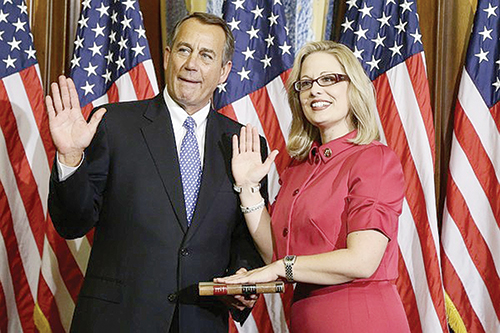U.S. Rep. Kyrsten Sinema (D-Ariz.) made history in November when she became the first openly bisexual person elected to Congress, but she’s also recognized as being the only “nontheist” to serve in the 113th.
Hey, hey, I’m a nonbeliever

U.S. Rep. Kyrsten Sinema (D-Ariz.) made history in November when she became the first openly bisexual person elected to Congress, but she’s also recognized as being the only “nontheist” to serve in the 113th.
On Jan. 7 she was sworn into office, laying her hand not on the Bible but on a copy of the Constitution. Sinema doesn’t identify as an atheist, yet she says she isn’t a member of a faith community.
Polling has on many occasions shown that atheism is a difficult demographic to quantify. According to a Pew Research Center report released in October 2012, 19.6 percent of people polled identified as “religiously unaffiliated,” and of that number, 2.4 percent identified as atheists (that’s about six million people). However, 13.9 percent of the unaffiliated identified as “nothing in particular.”
The number of unaffiliated has increased by 4.3 percent since a similar study conducted in 2007. Polling from the last decade shows that the religiously unaffiliated and atheist populations are indeed increasing in all demographics in the U.S. And now, with the first-ever religiously unaffiliated member of Congress, it’s time to examine the systemic discrimination against nontheists that many people aren’t aware exists.
There are seven U.S. states that prohibit atheists from holding office: Arkansas, Maryland, Mississippi, North Carolina, South Carolina, Tennessee and Texas.
Those states’ constitutions aren’t ambiguous in their discrimination, using phrases like: “The following persons shall be disqualified for office: First, any person who shall deny the being of Almighty God,” (from the North Carolina Constitution) or “No person who denies the being of God, or a future state of rewards and punishments, shall hold any office in the civil department of this state,” (from Tennessee).
Furthermore, Pennsylvania’s Constitution explicitly states that theists will be offered all protections of the state but makes no mention of those without religious beliefs. While these claims aren’t necessarily enforced, their presence represents an inequity that can only be corrected by the elimination of these statements from state constitutions.
Like other forms of intolerance, discrimination against atheists is documented only by those who are able to file lawsuits, or when there is an opportunity to share an anecdote of discriminatory behavior.
There are widespread accounts of atheist parents being denied custody of their children; anecdotes of U.S. military soldiers being required to attend chapel; lawsuits that battle the blocking of atheist and free-thought websites in public schools; accounts of jurors or witnesses being denied the right to take a nonreligious oath in court—yet this discrimination is not often recognized.
Like discrimination against many other groups, those who are actively doing the discriminating deny the existence of any unfair treatment.
Recently, the federal government has undertaken some causes to protect the rights of atheists, such as the 2004 decision by the Department of Defense to end sponsorship of Boy Scout units. An American Civil Liberties Union lawsuit challenged the legality of the Boy Scouts of America openly discriminating against atheists and thus preventing nontheists from joining the BSA. As a result, the BSA transferred their resources out of all public schools in 2005.
In cases documenting prohibition of access to secular websites in public schools or the lack of nonreligious oaths in court, the government does rule on the side of the First Amendment, but these actions are small steps and only arise when an act of discrimination has occurred.
Nonbelievers are a rapidly expanding group in the United States and yet there is undeniable discrimination built right into the documents meant to protect the rights of citizens within their states. Much like the rapidly shifting conversation regarding equal marriage and lesbian, gay, bisexual and trangender rights, it’s time for the government to openly protect the rights of those who don’t hold religious beliefs.
We are entering a new era of acceptance, one in which young voters are increasingly likely to favor equal marriage and immigration reform. According to the aforementioned Pew Research study, 32 percent of 18–29 year olds identify as religiously unaffiliated.
This group holds not only the largest percentage of religiously unaffiliated individuals, but has also shown in recent elections that their input is influential. If one-third of young eligible voters don’t identify as religious, then now is the time for a serious push toward protecting a person’s right to reject religion.
Just as 2012 was the election year of major advances in marriage equality, 2016 must be the election year of the nonbeliever.





Thanks for posting! I do believe non theists are the most oppressed minority in the US, and we need to pay attention to this!